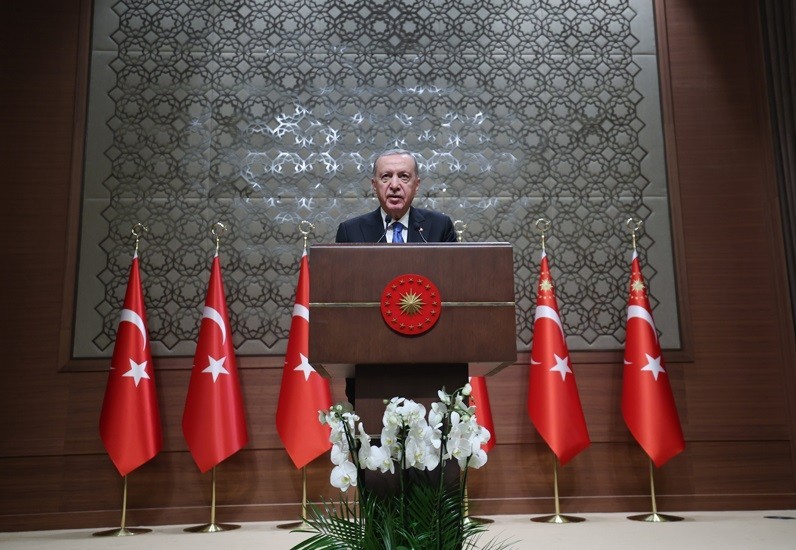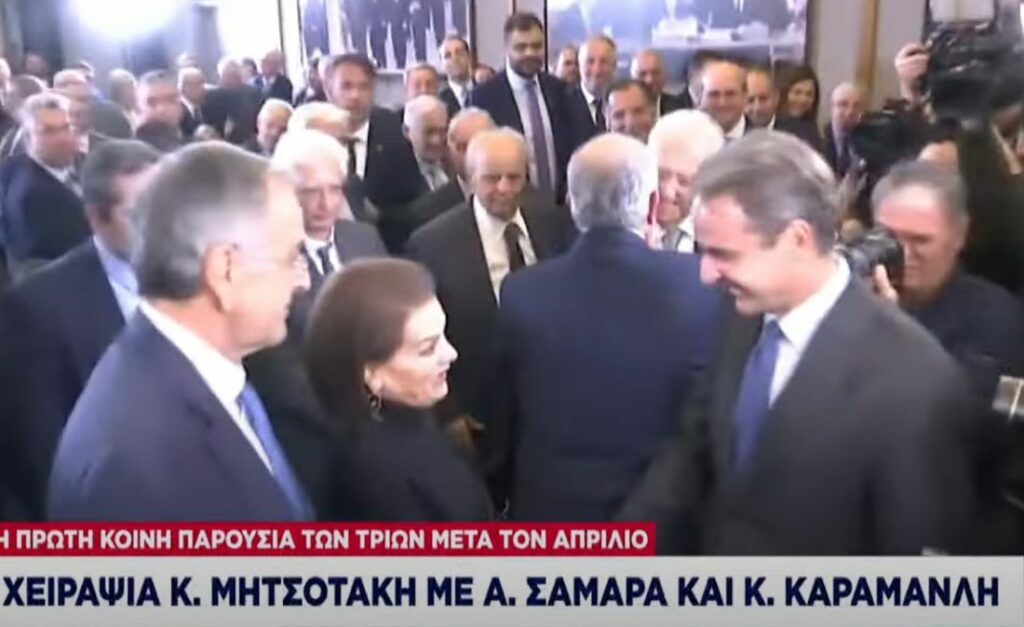
Η αμερικανική κυβέρνηση επιμένει ότι η Τουρκία πρέπει να σεβαστεί τα δικαιώματα των πολιτών της
Η αμερικανική κυβέρνηση συνεχίζει την κριτική κατά του πρωθυπουργού της Τουρκίας Ταγίπ Ερντογάν για την αστυνομική βία εναντίον Τούρκων πολιτών, αλλά αποτελεί μυστήριο μέχρι σήμερα η σιωπή του προέδρου Μπάρακ Ομπάμα, ο οποίος σε άλλες παρόμοιες περιπτώσεις τοποθετείται δημόσια. Μετά τον υπουργό Εξωτερικών Τζον Κέρι, μπήκε στο χορό των σκληρών επικριτών της Τουρκίας και ο αντιπρόεδρος Τζόζεφ Μπάϊντεν. Είναι αξιοσημείωτο ότι η εκπρόσωπος του Στέϊτ Ντιπάρτμεντ αν και διέψευσε ότι η Τουρκία είναι Δημοκρατία δεύτερης κατηγορίας, δεν απάντησε στο ερώτημα εαν την θεωρεί πρώτης κατηγορίας…
Ο κ. Κέρι είχε χθες το βράδυ μία δύσκολη επικοινωνία με τον Τούρκο ομόλογό του, Αχμέτ Νταβούτογλου. Υπήρξε διαφωνία σε όλα τα θέματα και ο κ. Νταβούτογλου δεν δέχθηκε την κριτική του Αμερικανού υπουργού. Ο κ. Κέρι εξέφρασε την ισχυρή αμερικανική θέση υποστήριξης των ανθρωπίνων δικαιωμάτων και του δικαιώματος των πολιτών να διαδηλώνουν και να εκφράζονται ελεύθερα.
Του απάντησε ο Τούρκος υπουργός και μάλιστα με σκληρό τρόπο όπως διέρρευσε η Αγκρα. Σύμφωνα με επίσημη τουρκική πηγή ο κ. Νταβούτογλου εξέφρασε τη δυσαρέσκεια της χώρας του για τα σχόλια Αμερικανών αξιωματούχων λέγοντας ότι η Τουρκία δεν είναι Δημοκρατία δεύτερης κατηγορίας. Ο κ. Νταβούτογλου τόνισε ότι η αμερικανική κυβέρνηση αντιμετωπωπίζει με λάθος τρόπο τις διαδηλώσεις και είπε ότι παρόμοιες κινητοποιήσεις έγιναν και στην Αμερική, κάτι βεβαίως που δεν είναι ορθό. Ανακοίνωσε στον κ. Κέρι ότι η Τουρκία κάνει έρευνα για ενδεχόμενη, όπως είπε, υπερβολική βία, όταν ο Αμερικανός υπουργός του είπε ότι είναι αίτημα της Ουάσιγκτον η έρευνα.
Από την πλευρά του, ο Αμερικανός αντιπρόεδρος κάλεσε την τουρκική κυβέρνηση να σεβαστεί τα δικαιώματα των πολιτικών της. Ο κ. Μπάιντεν δεν έκρυψε τη δυσαρέσειά του. Ο κ. Μπάιντεν είπε ότι η Τουρκία έχει μια ευκαιρία να φθάσει στο στόχο της και να γίνει μια από τις δέκα ισχυρότερες οικονομίες έως το 2023, αλλά δεν πρέπει να παρεκκλίνει από τις αρχές της δημοκρατίας.
Επίσης χαιρέτισε τις δηλώσεις του αντιπροέδρου της τουρκικής κυβέρνησης που ζήτησε συγνώμη για την υπερβολική χρήση βίας, κάτι που έκανε και ο εκπρόσωπος του Λευκού Οίκου.
Η συζήτηση της εκκπροσώπου του Στέϊτ Ντιπάρτμεντ με τους δημοσιογράφους ακολουθεί:
QUESTION: On Turkey.
MS. PSAKI: Go ahead, okay.
QUESTION: Could you confirm that yesterday – you mentioned that the Secretary was going to try and phone to his Turkish counterpart Davutoglu and that they did indeed talk?
MS. PSAKI: They did.
QUESTION: And can you confirm the – apparently, according to Turkish media – no, according to the foreign ministry talking to AFP, actually, Davutoglu told Kerry – and he was pretty angry about some of the comments that the Secretary’s made about excessive use of force during the demonstration – apparently, he told the Secretary that Turkey is not a second-class democracy.
MS. PSAKI: Well, I don’t want to confirm the comments of the Foreign Minister. What I can do is confirm they did speak and that the Secretary – they spoke quite a bit, of course, about Syria and moving forward. But they also talked about the Secretary’s concerns, ongoing concerns about the situation on the ground, and he also welcomed the update on efforts to calm the situation on the ground that some officials have called for.
And let me just reiterate the Secretary and Foreign Minister have had a very positive working relationship. They’ve worked together very closely on a number of issues, most specifically on Syria and the crisis ongoing there. That will continue. We have no doubt about that.
There – we – at the same time, the Secretary and others in this building don’t hold back when there are concerns that we have as well. And we have had concerns over the past couple of days about instances of police brutality, and we continue to call for, of course, the acceptance of peaceful protest. And that’s something we do around the world. So certainly, he was making no effort to quantify or qualify Turkey in any way other than to express support for calls for calm that have happened on the ground, express his belief that that needs to continue to happen, and to continue his very positive working relationship with the Foreign Minister.
QUESTION: But you don’t consider Turkey as a second-rate or second-class democracy, do you?
MS. PSAKI: No.
QUESTION: First-rate? (Laughter.)
MS. PSAKI: I’m not going to do rankings in here, Brad. I appreciate the opportunity, though.
QUESTION: Well, presume – obviously, the Foreign Minister has done a ranking and felt that the criticism that was coming from this building and from the Secretary himself was overly – was unduly harsh. Would you accept that?
MS. PSAKI: We would not. Obviously, the protests and the incidents that we’ve talked about a little bit over the past couple of days that have happened on the ground, reports of police brutality and injuries and even a couple of deaths, that’s concerning. And we continue to call for acceptance and support for peaceful protest not just in Turkey, but around the world. That’s our consistent belief and our consistent feeling. At the same time, we still have a very good, positive working relationship with the country of Turkey. The Secretary and the Foreign Minister have struck up quite a friendship and they’ve worked together closely on Syria and other global crises we’re facing, and we expect that will continue.
QUESTION: That doesn’t address the issue of democracy. You have good relationships with completely undemocratic countries, correct? So what does saying that you have a good relationship regarding Syria have to do regarding your concerns about its democratic trajectory?
MS. PSAKI: Well, Brad, I think it’s relevant because the point is that we work closely with Turkey as a NATO ally on a number of issues, including Syria, which is one of the most devastating global crises happening right now, and they are a very close partner on that. At the same time, we have had concerns about some of the reports from the protests, and that’s natural we would express that given our support for peaceful expression and human rights around the world.
QUESTION: Do you feel Turkey’s democracy is mature enough to be able to handle this current crisis and get back on track?
MS. PSAKI: We feel – and the Secretary said this the other day – that he feels confident that they can continue to move forward. He was pleased to see the calls for calm, hopes that continues. And we look forward to working with them on a number of issues.
QUESTION: So there’s no fear in this building that the Secretary’s comments will in any way undermine or harm the relationship that you have with Turkey?
MS. PSAKI: We certainly – certainly not.
QUESTION: But it seems that it’s obvious a reason of tension between the two, because I mean, Foreign Minister Davutoglu’s comment on your remarks actually is very harsh because he’s blaming U.S. side to see those protests as extraordinary while you are interpreting other protests all around the world ordinary.
MS. PSAKI: Well, I would refute the notion that we – that they are extraordinary in that any time there are incidents of police – potential police brutality or opposition to what we see as opposition to the freedom of expression, that’s something we often talk about in this room, the Secretary talks about, that’s something we regularly bring up and highlight.
What I was stating was that we have a very important partnership with Turkey on a number of issues, and we feel confident that will continue.
QUESTION: In fact, the Foreign Minister reportedly also compared the protests in Ankara and other Turkish cities to the protests that we saw a couple of years ago with the Occupy Wall Street movement, in which we also did see a lot of arrests and court cases and things like that. Is that a fair comparison?
MS. PSAKI: Again, there’s going to be an investigation into what happened on the ground here. We support peaceful protests, whether that’s in the United States or in other countries, so I would just reiterate that.
QUESTION: Jen, but let me ask you, on the words and the things that Mr. Erdogan has said in the last few days, I mean, do you consider that to be draconian or calling for draconian measures? For instance, he’s really insulting basically people that drink beer, telling them to drink yogurt instead, telling them not to do this and so on. Very, sort of, very aggressive Islamist kind of agenda. Do you consider that to be not helpful towards a vibrant democracy?
MS. PSAKI: Well, we think what would be helpful is for all officials to encourage calm in the country and support peaceful protests. So that’s what we’re encouraging everybody to do.
QUESTION: (Inaudible) a Prime Minister who is, a prime minister of all Turks, of all political orientations, should back away from that kind of rhetoric?
MS. PSAKI: I’m not going to go further on that than I’ve just gone.
QUESTION: But he’s promising – I mean, it’s a very reasonable question, actually. He’s promising this rhetoric for you to calm down all the protests. Because even yesterday, Vice Prime Minister Babacan was here, and he was the most reasonable ministers in the cabinet, he even used the word of terrorists in his speech defining this protest. I mean, is this rhetoric promising to solve this question?
MS. PSAKI: I think I answered it. It’s – what is most helpful is for all the officials, as some have, to encourage calm and encourage peaceful – and accept peaceful protest. And language and verbiage that’s not doing that is not helpful toward moving forward.
QUESTION: You will keep to raise this issue – I mean, after that, even if the protest will be going on after giving this – after the speech that the Secretary Kerry took with Foreign Minister Davutoglu? You will keeping to raise this issue?
MS. PSAKI: Well, our ambassador and other officials on the ground have been in close contact. Obviously, the Secretary was in contact with his counterpart just yesterday. We’re hopeful that there will be a peaceful resolution here of course, but where we see issues that need to be raised, we will certainly continue to raise them.

